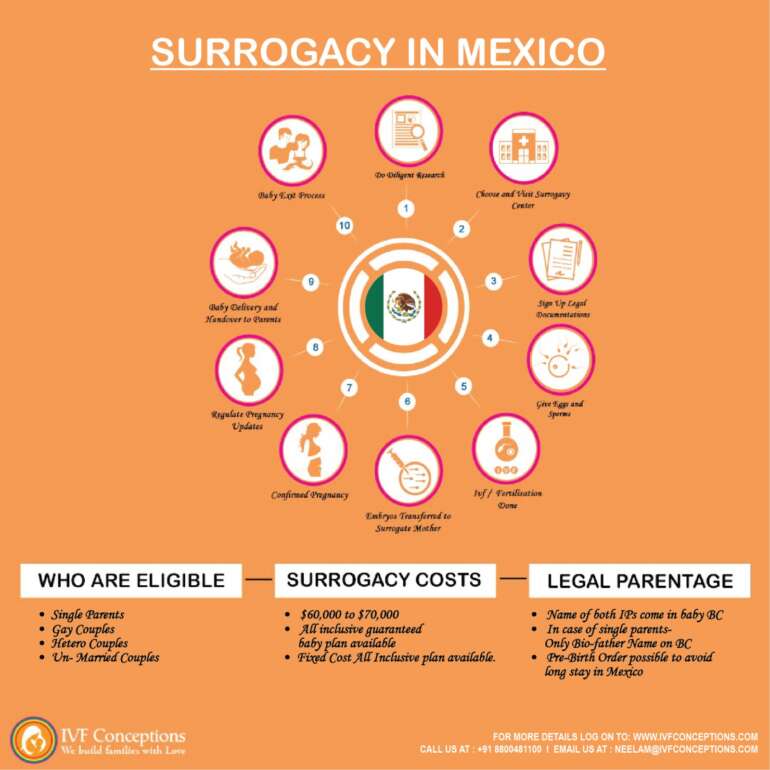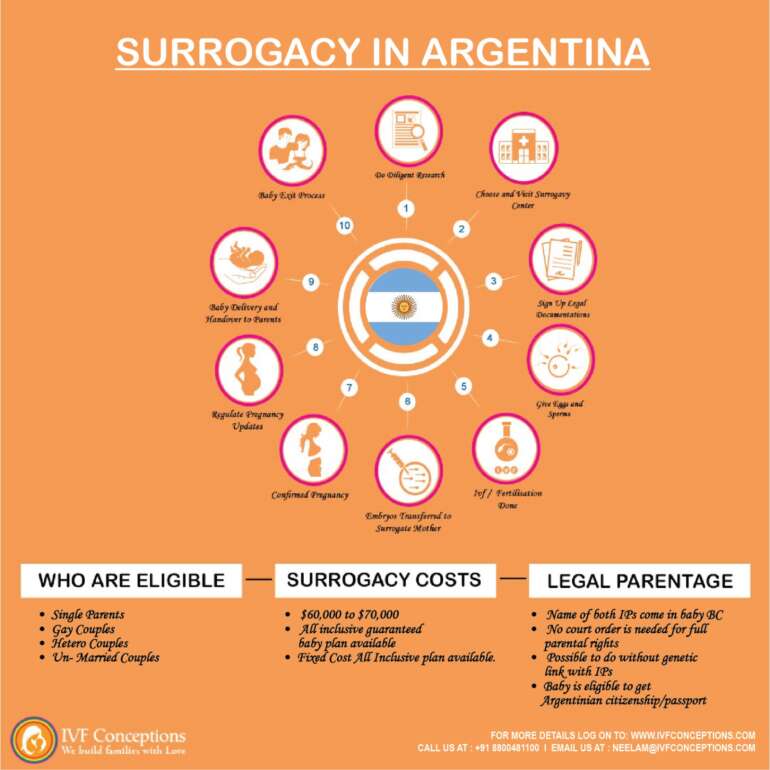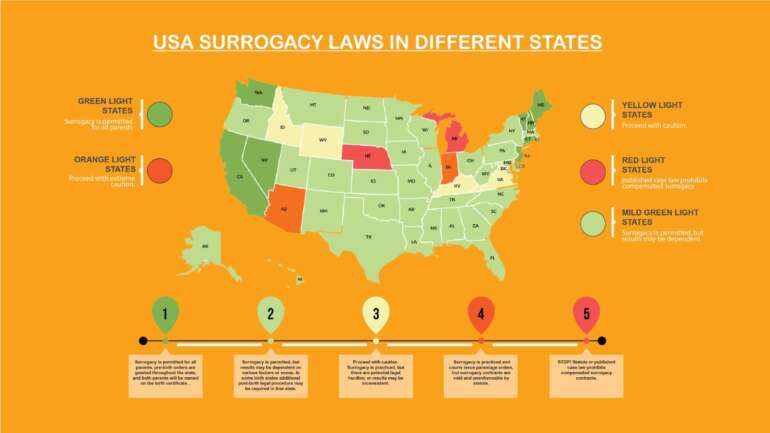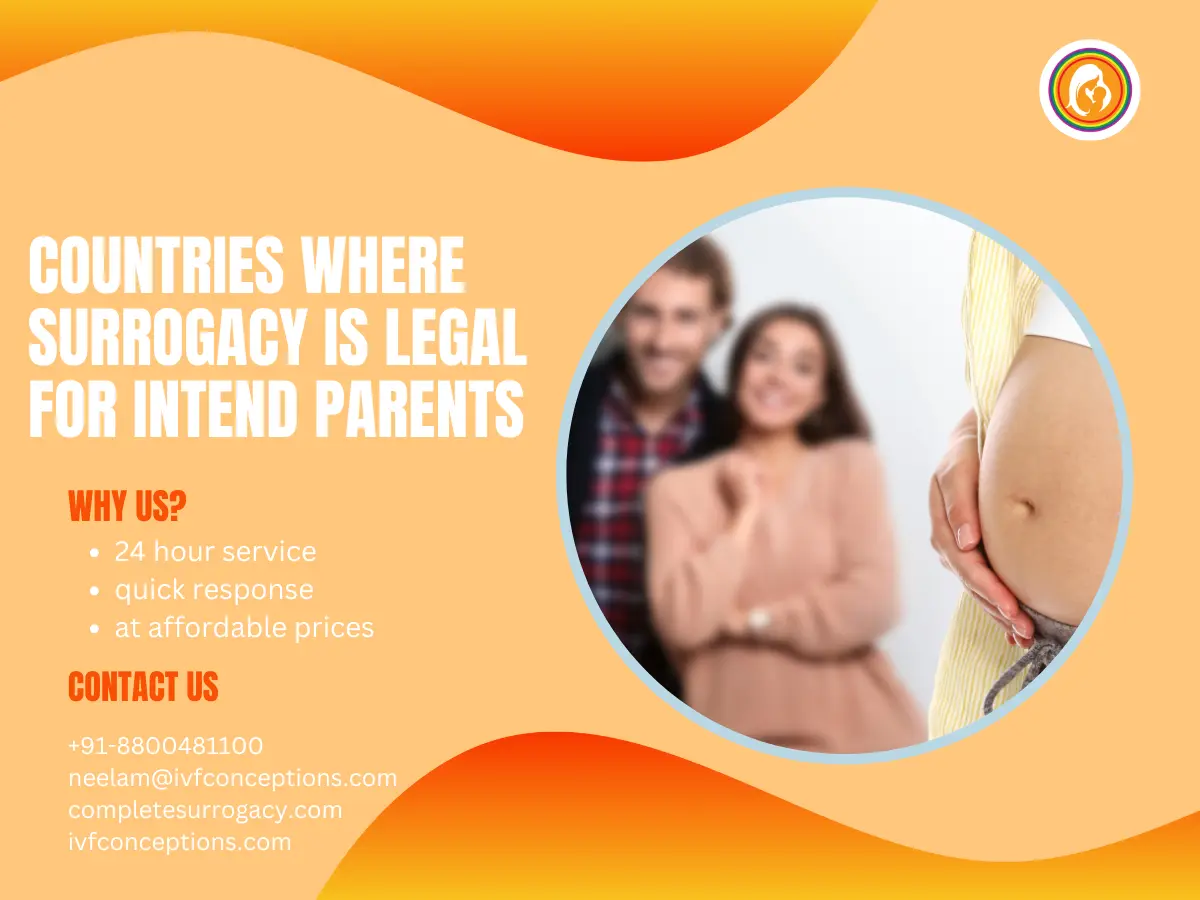Countries That Allow Legal Surrogacy
Surrogacy laws and regulations vary significantly across the globe, with some countries embracing it while others prohibit or heavily restrict the practice. The legal status of surrogacy is influenced by cultural, religious, and ethical considerations unique to each nation. In this blog, we will go in depth regarding countries where surrogacy is legal and you can consider this as your guide for international surrogacy guide, if you are considering it as your parenthood options.
- Book an online appointment: Get a free online consultation.
- Call\W:+91-8800481100 Email:neelam@ivfconceptions.com
In recent years, there has been an upward trend in international surrogacy. Cross-border surrogacy arrangements offer significant benefits for intended parents, including cost advantages and the opportunity to combine the surrogacy process with leisure travel.
Additional Guides for Surrogacy in Georgia
What are the Starting Steps for Surrogacy Process in Georgia?
How Much Does Surrogacy Cost in Georgia Country
Surrogacy for Hetero Couples in Georgia Europe
The United States, Georgia, Mexico, Ukraine and Greece are among the countries where commercial surrogacy is legal. Additionally, altruistic surrogacy (without monetary compensation for the surrogate) is permitted in countries like Colombia, Argentina, Guatemala, the United Kingdom, Canada, and Australia. For intended parents, the cost of surrogacy is a crucial factor, making destinations that offer affordable options with robust legal protection an attractive consideration. So, while considering international surrogacy countries do play a lots of attention to the legal framework as well as the affordable surrogacy cost factors.
What is International Surrogacy?
International surrogacy involves intended parents pursuing a surrogacy arrangement in a country other than their home country. This decision is often driven by factors such as high surrogacy costs in their home country or unfavorable legal frameworks.
Banned and Legal Surrogacy Destinations
Certain countries, including India and Thailand, were once popular destinations for international surrogacy due to their affordable medical services and availability of surrogates. However, adverse media reports and unethical practices led to bans on surrogacy services for foreigners in these nations. Neighboring countries like Nepal and Cambodia briefly emerged as alternatives but faced similar clampdowns due to legal concerns and potential exploitation.
India has now banned foreign surrogacy, and commercial surrogacy for its citizens may soon be prohibited as well. Russia has also stopped allowing foreign couples to pursue surrogacy, limiting access only to Russian nationals.
Worldwide Surrogacy Options
While options in Asia remain limited, countries like Laos still allow unregulated surrogacy, primarily catering to gay couples or single men from neighboring nations like China and Singapore. However, the absence of legal frameworks in such destinations poses significant risks.
Each year, more childless couples and individuals seek surrogacy arrangements, driven by a strong desire for parenthood. While some are willing to take calculated risks in unregulated countries due to financial constraints, thorough research and consulting with international surrogacy agencies is crucial to understand the legal landscape and potential risks.
Surrogacy countries for Heterosexual Couples
In Europe, countries like Georgia and Ukraine currently offer legal and secure commercial surrogacy options for heterosexual couples, including foreigners. Latin American nations such as Colombia and Mexico are also desirable destinations, offering surrogacy services to same-sex couples at varying costs.
Surrogacy countries for Same-Sex Couples
For gay couples, the most secure surrogacy option is currently available in certain U.S. states like California, albeit at higher costs. Colombia has recently emerged as an attractive and affordable destination for same-sex surrogacy seekers, offering legally viable and secure services at lower costs compared to the U.S. and other gay-friendly countries like Mexico and Argentina.
Surrogacy in Colombia
Colombia, a Latin American nation, has recently emerged as a surrogacy destination. The country’s capital, Bogotá, offers quality medical services accessible to both locals and foreigners. This newcomer on the surrogacy landscape presents an appealing option for same-sex couples seeking an affordable yet legally secure avenue for gay surrogacy. Currently, Colombia offers one of the most cost-effective and safest alternatives for prospective same-sex parents pursuing surrogacy.
The all-inclusive guaranteed surrogacy program in Colombia costs $65,000, making it an attractive choice. Among the benefits of choosing Colombia for surrogacy are:
- The lowest surrogacy cost for gay couples compared to the USA, Mexico, and Argentina, which are considered gay-friendly surrogacy destinations.
- The only country to legally offer an affordable guaranteed baby program, priced at $65,900.
- Well-equipped medical facilities with impressive IVF success rates.
- A legally viable, safe, and secure environment for LGBTQ+ surrogacy arrangements.
- A vast database of beautiful egg donors.
- A well-established track record, having successfully completed over 1,000 surrogacy journeys for intended parents.
Consequently, Colombia stands out as the most cost-effective surrogacy destination in Latin America, catering to all family types, while being the preferred choice for gay couples seeking surrogacy services.
Surrogacy in Mexico

Mexico offers an affordable and secure guaranteed baby program for $68,000, providing fixed-price packages with unlimited clinical and administrative services. With a team boasting over 13 years of global surrogacy experience, Mexico City presents the most cost-effective, reliable, and trustworthy surrogacy programs.
The inclusive guaranteed egg donor surrogacy program in Mexico for all family types is priced at $68,900. Following a new Supreme Court ruling in 2021, Mexico has emerged as one of the best global options for singles and couples of all sexual orientations seeking to build a family through an affordable and legally recognized surrogacy arrangement.
Mexico opens doors for all intended parents, regardless of their family setup, to embark on the surrogacy journey and grow their families. However, it is mandatory to establish at least one genetic link between the child and the commissioning parents.
Other notable benefits of pursuing surrogacy in Mexico include:
- Significantly lower costs compared to the USA, allowing savings of up to 70% on typical American surrogacy expenses through the assured or guaranteed baby plan, making it an affordable alternative to U.S. surrogacy, just a 3-hour flight away from Los Angeles.
- An assured plan program priced at $67,000, offering affordability and legal security.
- Well-equipped medical facilities with impressive success rates.
- Legal recognition for same-sex couples, permitting all intended parents, whether single, married heterosexual couples, gay couples, or live-in partners, to pursue surrogacy, provided at least one intended parent has a genetic link to the child.
- A vast database of beautiful egg donors and no waiting list for dedicated surrogate mothers.
Consequently, Mexico stands out as the most cost-effective surrogacy destination worldwide for all family types and is the preferred choice for gay couples seeking surrogacy services.
More Resources to Read:
Guaranteed Surrogacy in Georgia
How Does Gestational Surrogacy Work in Georgia? Step-by-step Guidance
Surrogate Mother Cost in Georgia
Surrogacy in Argentina

Argentina offers surrogacy services for intended parents of all family types and backgrounds. The country provides a guaranteed baby surrogacy program at an affordable cost of $65,000 USD. This fixed-price program includes unlimited clinical and administrative services until the intended parents are able to take their baby home.
The guaranteed baby surrogacy package in Argentina covers all expenses related to the surrogacy journey, from the initial medical procedures to the safe arrival of the newborn with the intended parents. The comprehensive program ensures that intended parents have access to all necessary services and support throughout the process, without incurring any additional costs.
With a commitment to inclusivity, Argentina welcomes intended parents regardless of their marital status, sexual orientation, or family configuration. This inclusive approach allows single individuals, same-sex couples, and heterosexual couples alike to pursue their dreams of parenthood through surrogacy in a supportive legal environment.
The surrogacy process in Argentina is carried out in accordance with the country’s legal framework, ensuring the protection of all parties involved, including the intended parents, surrogate, and the child. The fixed-price program offers intended parents a transparent and predictable cost structure, allowing them to plan their journey without worrying about unexpected expenses.
Overall, Argentina presents a compelling option for intended parents seeking a reliable, affordable, and legally secure surrogacy experience, catering to the diverse needs of families worldwide.
Considerations for International Surrogacy
Before pursuing international surrogacy, intended parents should consider the following factors:
- Legal protection for intended parents, surrogate children, and surrogate mothers.
- Legal parentage and the process of establishing parental rights.
- Eligibility criteria for intended parents (single individuals, same-sex couples, heterosexual couples).
- Birth certificate registration and naming conventions.
- Enforceability of surrogacy contracts.
- Timeframes for taking the baby home after birth.
- Availability and costs of neonatal intensive care units (NICU) in case of premature delivery.
- Requirement for local legal representation and support from surrogacy agencies.
- Necessity for obtaining parental orders or adoption procedures.
- Availability of preimplantation genetic diagnosis (PGD) and next-generation sequencing (NGS) for genetic screening.
- Regulations regarding gender selection, if desired.
- Prior experience and references from successful intended parents from their country.
International Surrogacy Laws by Country

Summarizing international surrogacy laws in different countries:
| Country | Who is Allowed | Type of Surrogacy Allowed |
|---|---|---|
| Australia | Citizens/Residents | Only Altruistic |
| Canada | Citizens/Residents; Foreigners allowed for Altruistic | Only Altruistic |
| Greece | Heterosexual Couples, Single Females; Foreigners need court order | Commercial |
| Georgia | Heterosexual Couples (including foreigners) | Commercial |
| Ukraine | Heterosexual Couples (including foreigners) | Commercial |
| India | Only Indian Citizens | Commercial (for now) |
| Israel | Heterosexual Couples, Israeli Citizens | Only Altruistic |
| Kenya | Open to Foreigners | Commercial (Not legally protected) |
| Laos | Open to Foreigners | Commercial (Unregulated) |
| Nigeria | Only Nigerian Citizens | Altruistic and Commercial |
| South Africa | Only Citizens/Residents | Only Altruistic |
| Thailand | Only Thai Heterosexual Couples | Only Altruistic |
| United Kingdom | Citizens/Residents | Only Altruistic (No advertising for surrogates) |
| United States | Open to Foreigners | Commercial (Laws vary by state) |
| Mexico | All Family Types (Genetic Link Required), Including Foreigners | Commercial |
| Colombia | All Family Types, Including Foreigners | Commercial |
| Argentina | All Family Types, Including Foreigners | Commercial |
Note: Laws are subject to change, and it’s advisable to verify the latest regulations before pursuing international surrogacy.
The legal landscape for surrogacy varies across countries, and it is essential to research the specific regulations and requirements for each destination. Some key points:
– Australia: Only altruistic surrogacy is available, with no donor or surrogate matching services.
– Canada: Only altruistic surrogacy is available, but foreigners can access it.
– Greece: Heterosexual couples and single females are eligible, with foreigners requiring a prior court order.
– Georgia and Ukraine: Compensated or commercial surrogacy is allowed for heterosexual couples, including foreigners.
– India: Commercial surrogacy is currently not allowed and only altruistic only allowed for Indian citizens, NRI, and OCI.
– Israel: Only altruistic surrogacy is available for heterosexual couples and Israeli citizens.
– Kenya, Laos, and Nigeria: Compensated surrogacy is available, but with limited or no legal protection.
– South Africa and Thailand: Only altruistic surrogacy is available for citizens/residents.
– United Kingdom: Only altruistic surrogacy is available, with no advertising for surrogates permitted.
– United States: Gay and heterosexual foreigners can access surrogacy, with laws varying by state.
What factors to consider before cross-border surrogacy or international surrogacy:
By thoroughly researching and addressing these critical aspects, intended parents can make well-informed decisions and increase their chances of a smooth and successful international surrogacy journey.
Before opting for international surrogacy destinations, prospective intended parents should consider the following crucial factors:
- Legal Protections: Understand the legal safeguards in place for intended parents, surrogate children, and surrogate mothers. Ensure that surrogacy laws adequately cover their rights and interests.
- Establishing Legal Parentage: Determine whether legal parentage is automatically granted to the commissioning parents or if they need to go through an adoption process or obtain a court order.
- Eligibility Criteria: Familiarize yourself with the eligibility requirements for different family setups, such as single parents, same-sex couples, or heterosexual couples, to participate in surrogacy arrangements.
- Birth Certificate Registration: Clarify whose names will appear on the child’s birth certificate – the intended parents or the surrogate mother, as this can vary across jurisdictions.
- Enforceability of Contracts: Assess whether surrogacy contracts are legally enforceable in the chosen destination, providing a secure legal framework for all parties involved.
- Time to Take the Baby Home: Inquire about the typical timeframe for intended parents to take their newborn home after delivery, as this can differ based on local regulations and processes.
- Neonatal Intensive Care Availability and Costs: In case of premature delivery, understand the availability and associated costs of neonatal intensive care units (NICU) for the baby’s well-being.
- Local Legal Representation: Determine if hiring a local lawyer is necessary to navigate legal processes and the extent to which surrogacy agencies can provide assistance.
- Parental Orders: Clarify if obtaining a parental order is required to establish legal parentage, as is the case for intended parents from certain countries like the UK.
- Genetic Testing Options: Understand the availability and legality of preimplantation genetic diagnosis (PGD) and next-generation sequencing (NGS) to screen for genetic disorders if desired.
- Gender Selection: Inquire about the regulations surrounding gender selection, if this is a consideration for the intended parents.
- References and Experience: Seek references and experiences from successful intended parents from their country who have pursued surrogacy in the chosen destination, as this can provide valuable insights.
Conclusion
Surrogacy is an emotionally and financially demanding process, often compounded by the complexities of international arrangements. While the prospect of creating a new life in an unfamiliar country can be daunting, thousands of prospective parents embark on this journey each month in pursuit of their dream of parenthood.
Accurate information and professional guidance are crucial to navigating the legal and logistical challenges of international surrogacy. A well-informed and carefully planned surrogacy journey can be a rewarding experience, leading to the birth of a long-awaited child. Consulting with reputable surrogacy agencies can help intended parents make informed decisions and ensure a smooth and secure path to parenthood.
If you’d like to learn more about IVF, Egg Donation, or surrogacy services globally, check out the rest of our website at Georgia Surrogacy Agency. We offer legally secure and affordable surrogacy consulting services for FREE.
Our team has over 14 years of experience facilitating surrogacy arrangements, egg donation, and serving as an advocacy resource for infertile couples and LGBTQ individuals seeking to build families.
For more resources on IVF and Surrogacy, browse our other web page- IVF Conceptions.
For more resources on IVF and Surrogacy, browse our other web page- Complete Surrogacy.
More reference:
https://www.aljazeera.com/features/2023/9/6/georgia-plans-to-ban-commercial-surrogacy
https://ge.usembassy.gov/message-for-u-s-citizens-new-law-banning-surrogacy-planned-in-georgia/
FAQs for Legal Surrogacy Countries
Which countries permit surrogacy for intended parents?
Surrogacy is legally permitted for intended parents in several countries, including the USA, Ukraine, Greece, Canada, Georgia, Mexico, Colombia, and others.
What are the legal prerequisites for surrogacy in different nations?
Legal requirements for surrogacy vary by country, encompassing age limits, residency criteria, and specific contractual obligations. Please contact us to ascertain the eligibility criteria for each jurisdiction.
Are there age restrictions for intended parents in surrogacy agreements?
Yes, certain countries impose age restrictions on intended parents pursuing surrogacy services. For instance, in Greece, women up to 50 years old can participate in surrogacy. It’s important to review the legal statutes of each country to understand the precise age thresholds.
What is the cost of surrogacy in different countries?
Surrogacy expenses vary significantly depending on the country and the range of services offered. Countries like Colombia, Mexico, and Georgia offer more affordable surrogacy options compared to destinations like the USA or Australia.
What are the success rates of surrogacy in diverse locations?
Surrogacy success rates vary based on factors such as age, gamete quality, and individual circumstances, in addition to healthcare infrastructure, regulations, and medical facilities in each country. It’s advisable to research specific statistics for each destination.
- Are there restrictions on the nationality of intended parents in surrogacy programs? While there are generally no nationality-based restrictions, it’s essential to ensure that the baby will receive citizenship, passport, and travel documents to return home. Certain countries, particularly Muslim nations, may not recognize surrogacy and may not facilitate their citizens in the surrogacy process. Others, like Belgium, Denmark, and Italy, require citizens to consult local attorneys before proceeding with surrogacy.
- Can single individuals or same-sex couples pursue surrogacy in these countries? The permissibility of single individuals or same-sex couples engaging in surrogacy varies by jurisdiction. Some countries, such as Greece, Georgia, and Ukraine, may have specific regulations allowing only married heterosexual couples, while others may have fewer restrictions. Understanding the legal landscape of each nation is essential.

Neelam Chhagani, MA (Counselling Psychology), PGD (Mental Health), and Holistic Infertility and Third-Party Reproduction Consultant.
Member of European Fertility Society, Best Surrogacy Blogger of 2020, with 200 dedicated blogs and top contributor on Quora for Surrogacy.
Highly esteemed, authoritative, and trusted professional with a 14-year of experience in international surrogacy. Advocate for Secure, Legal, and Affordable International Surrogacy.


Add Your Comment